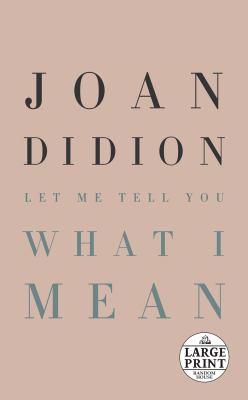
Let me tell you what I mean
Here are six pieces written in 1968 from the "Points West" Saturday Evening Post column Joan Didion shared from 1964 to 1969 with her husband, John Gregory Dunne about: American newspapers; a session with Gamblers Anonymous; a visit to San Simeon; being rejected by Stanford; dropping in on Nancy Reagan, wife of the then-governor of California, while a TV crew filmed her at home; and an evening at the annual reunion of WWII veterans from the 101st Airborne Association at the Stardust Hotel in Las Vegas. Here too is a 1976 piece from the New York Times magazine on "Why I Write"; a piece about short stories from New West in 1978; and from The New Yorker, a piece on Hemingway from 1998, and on Martha Stewart from 2000. Each one is classic Didion: incisive, bemused, and stunningly prescient.
Available Copies by Location
| Location | |
|---|---|
| Stamford | Available |
Other Formats
Browse Related Items
| Subject |
| Didion, Joan. |
| Genre |
| Large print books. Essays. |
- ISBN: 9780593396551
- Physical Description 191 pages (large print) ; 19 cm
- Edition Large print edition.
- Publisher [Place of publication not identified] : [publisher not identified], 2021.
Content descriptions
| General Note: | GMD: large print. |
Additional Information

Summary
Let Me Tell You What I Mean
A NEW YORK TIMES NOTABLE BOOK OF THE YEAR * NEW YORK TIMES BEST SELLER * From one of our most iconic and influential writers, the award-winning author of The Year of Magical Thinking : a timeless collection of mostly early pieces that reveal what would become Joan Didion's subjects, including the press, politics, California robber barons, women, and her own self-doubt. With a forward by Hilton Als, these twelve pieces from 1968 to 2000, never before gathered together, offer an illuminating glimpse into the mind and process of a legendary figure. They showcase Joan Didion's incisive reporting, her empathetic gaze, and her role as "an articulate witness to the most stubborn and intractable truths of our time" ( The New York Times Book Review ). Here, Didion touches on topics ranging from newspapers ("the problem is not so much whether one trusts the news as to whether one finds it"), to the fantasy of San Simeon, to not getting into Stanford. In "Why I Write," Didion ponders the act of writing: "I write entirely to find out what I'm thinking, what I'm looking at, what I see and what it means." From her admiration for Hemingway's sentences to her acknowledgment that Martha Stewart's story is one "that has historically encouraged women in this country, even as it has threatened men," these essays are acutely and brilliantly observed. Each piece is classic Didion: incisive, bemused, and stunningly prescient.


